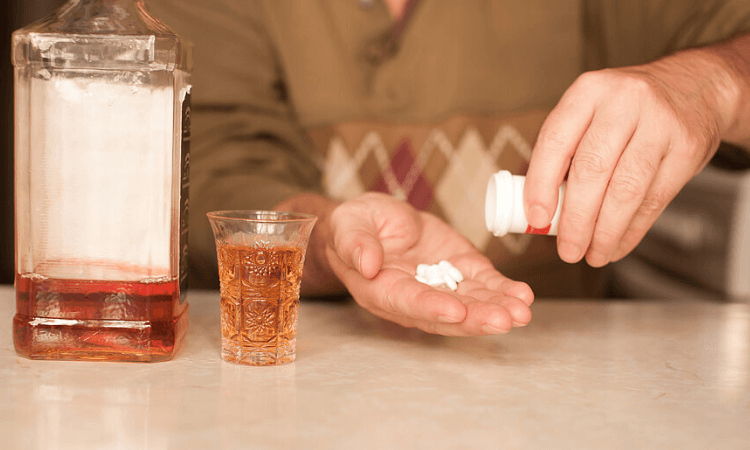
Is It Safe to Combine Celexa and Alcohol? – Celexa (citalopram) is a selective serotonin reuptake inhibitor (SSRI), a class of antidepressants that are among the most commonly prescribed for the treatment of depression. Combining Celexa and alcohol is never recommended, and can increase the severity of side effects associated with Celexa, reduce its effectiveness, and also lead to other health complications.
What Is Celexa?
Celexa works on the brain to boost levels of serotonin in the brain, a chemical that helps regulate mood and emotions. Doctors often prescribe Celexa to treat mild-moderate depression, and it can take as long as four weeks for users to experience a noticeable difference in mood. In essence, Celexa rebalances the amount of serotonin in the brain—an imbalance of serotonin in the brain is believed the be a primary reason why people experience depression.
Should You Mix Celexa and Alcohol?
When a person starts using a medication, there is usually a range of potential side effects that occur as a result, and Celexa is no exception. Alcohol has many adverse side effects of its own, and consuming alcohol can further exacerbate the side effects of citalopram.
Celexa side effects may include the following:
- Constipation
- Nausea and upset stomach
- Diarrhea
- Decreased libido
- Impotence
- Difficulty having an orgasm
- Dizziness
- Drowsiness
- Sleep problems (insomnia)
- Dry mouth
- Increased sweating
- Frequent urination
- Weight changes
- Stuffy nose and sneezing
- Sore throat and cough
Certain drug interactions or overdose may also cause serotonin syndrome—a serious and potentially life-threatening condition characterized by agitation, hallucinations, accelerated heart rate, dizziness, muscle tremors, nausea, vomiting, and diarrhea.
Celexa and Alcohol Consumption
Alcohol is a depressant, and using it in conjunction with other depressant drugs such as Celexa can have negative effects on one’s health. In fact, the Food and Drug Administration (FDA) recommends avoiding alcohol consumption while using Celexa.
Some of the risks of using Celexa with alcohol include:
- CStupor
- Intoxication
- Impaired judgment
- Feeling dazed
- Lethargic
- Increased risk of overdose
Long-Term Effects Of Combining Celexa and Alcohol
Alcohol can have powerful effects on a person’s physical and mental health. When alcohol is used with another drug, these adverse effects have a higher risk of emerging. Using Celexa and alcohol compounds the risk and severity of side effects associated with both substances.
Long-term effects of using Celexa with alcohol include the following:
- Decreased effectiveness of Celexa
- Increased risk of becoming chemically dependent on alcohol or developing an addiction
- Increased risk of overdose, coma, and death
Celexa and alcohol side effects can also be heart-related and can cause serious issues that require immediate medical attention or hospitalization. For example, one of the specific Celexa and alcohol side effects that can occur is known as torsades de pointes, which is a severe irregular heart rhythm (arrhythmia) that can lead to death.
Many people don’t realize that even a small amount of alcohol, when used with Celexa, can lead to an adverse reaction. If your doctor has prescribed you Celexa, consider taking an extended break from alcohol use in order to treat your depression appropriately with medication.
Alcohol and Depression

Alcohol use has long been known to contribute to depression and even cause it. A person who has been prescribed Celexa will have been given permission to use this medication because they suffer from some level of clinical depression. For this reason, people who drink alcohol while using Celexa for depression will likely find that Celexa is not only less effective but that the effects of the alcohol itself serve to make their depression worse.
Celexa Withdrawal
While the side effects of combining Celexa and alcohol can be severe, it’s also vital that you don’t abruptly stop using this medication because you want to drink. Sudden discontinuation of Celexa can result in the following withdrawal symptoms:
- Irritability
- Anxiety
- Rebound depression
- Nausea
- Vomiting
- Dizziness and vertigo
- Nightmares
- Headache
- Paresthesias
Treatment for Alcohol Abuse and Addiction
If you need addiction treatment for alcoholism, help is available. Recovery in Tune offers intensive outpatient and outpatient programs that include evidence-based services vital to the process of recovery, such as the following:
Intensive Outpatient Therapy
- Group therapy
- Individual counseling
- Family counseling
- Life skills training
- Motivational training
- Symptom management
- Psychoeducation
- Nutrition and wellness
- Family dynamics education
- Trauma recovery
- Grief counseling
- Drug abuse/relapse education
- Co-occurring disorder treatment
- Art and music therapy
- Recreational therapies
- Mindfulness meditation
- Yoga
- Case management and aftercare
- Legal assistance
- Health and medical support
- Employment/education support
- 12-step programs
- Psychiatric and medical services
- Transportation for sober living
Outpatient Treatment
- Evening group therapy
- Individual counseling
- Family counseling
- Drug abuse/relapse education
- Co-occurring disorder treatment
- Life skills training
- Motivational training
- Trauma recovery
- Art and music therapy
- Recreational therapies
- Case management and aftercare
- Employment/education support
- 12-step programs
- Psychiatric and medical services
- Transportation
People who enter our programs have either completed inpatient or partial-hospitalization programs or require scheduling flexibility that allows them to attend to personal obligations such as school, work, or family.
If you or someone you love is regularly consuming alcohol while using Celexa or any other antidepressant medication, call us today. Find out how we help people break free from the cycle of substance abuse for life!